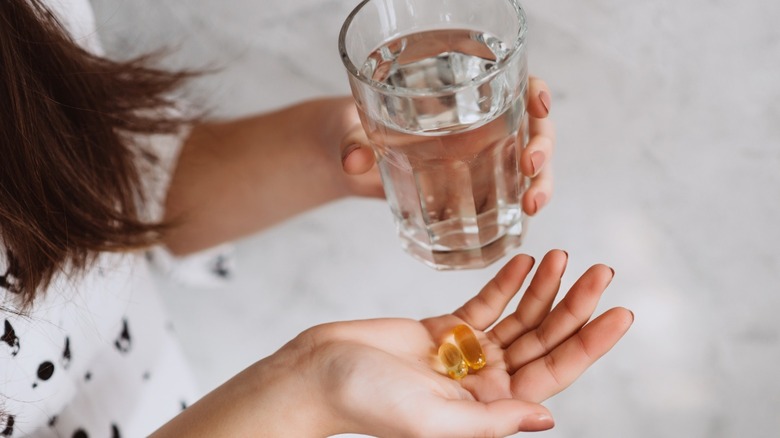Vitamin D Has Many Benefits, But Supporting Bone Health May Not Be One Of Them
If you are an older adult who takes vitamin D supplements as a way to support bone health, you may want to revisit whether this is providing you with the expected benefits. According to the results of a new study recently published in The New England Journal of Medicine, taking vitamin D supplements does not lead to any meaningful reduction in bone fractures in healthy people.
The research on the benefits of taking vitamin D supplements has been mixed in recent years. While a 2011 study recommended taking vitamin D supplements as a way to help promote bone health, some subsequent studies contradicted those findings, including one study that concluded taking vitamin D may even lead to increased falls, per NBC News.
The results of this latest vitamin D study — which followed approximately 26,000 participants over 50 years old throughout a five-year period — concluded that taking vitamin D supplements did not seem to have any measurable effect on healthy participants who did not have a severe vitamin D deficiency. However, lead study author Dr. Meryl S. LeBoff, director of the Skeletal Health and Osteoporosis Center at Brigham and Women's Hospital, told NBC News that the findings were not applicable to people who are severely deficient in vitamin D. Dr. Ethel Siris, an endocrinologist who was not involved with the study, told NBC News that vitamin D supplements can provide benefits to people with low bone mass or osteoporosis. This may be in addition to other medications.
These are the benefits of vitamin D
The Mayo Clinic describes vitamin D as an important nutrient because it must be present for your bones to absorb calcium. Vitamin D also acts as an anti-inflammatory with neuroprotective properties, helping to support cellular functions in your body, including immune health and brain function. The best way to absorb vitamin D is through sunlight and consuming certain foods. You can find vitamin D in fatty fish, such as salmon, mackerel, and sardines. Otherwise, it is difficult to find naturally occurring vitamin D in foods, though you can often find vitamin D in fortified milk and cereals. Your skin will also manufacture vitamin D when exposed to sunlight, but the quantity will depend on the time of day and the season.
Given the challenges of getting enough vitamin D in your system, the Mayo Clinic points out that doctors may advise older adults to take appropriate doses of a vitamin D supplement if vitamin D levels are low in their blood. Low vitamin D can put some older adults more at risk for soft, brittle bones and osteoporosis.
If you are taking vitamin D supplements, experts say that it's important to factor in the vitamin D you are getting from foods and sunshine to avoid overdosing on vitamin D — it can lead to nausea, vomiting, leg cramps, and other side effects. They also advise that you consult with your doctor about the safest ways to elevate your vitamin D levels, per CNN.

